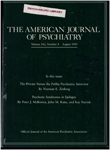Comparison of the effects of cognitive therapy and pharmacotherapy on hopelessness and self-concept
Abstract
The authors examined the effects of cognitive therapy and imipramine on hopelessness and self-concept in 35 unipolar nonpsychotic depressed outpatients who were treated with either modality over approximately 11 weeks. Compared with imipramine, cognitive therapy resulted in significantly greater improvements in hopelessness and more generalized gains in self-concept. Thus, cognitive therapy may offer a particular advantage in reducing hopelessness and improving low self-concept in depression.
Access content
To read the fulltext, please use one of the options below to sign in or purchase access.- Personal login
- Institutional Login
- Sign in via OpenAthens
- Register for access
-
Please login/register if you wish to pair your device and check access availability.
Not a subscriber?
PsychiatryOnline subscription options offer access to the DSM-5 library, books, journals, CME, and patient resources. This all-in-one virtual library provides psychiatrists and mental health professionals with key resources for diagnosis, treatment, research, and professional development.
Need more help? PsychiatryOnline Customer Service may be reached by emailing [email protected] or by calling 800-368-5777 (in the U.S.) or 703-907-7322 (outside the U.S.).



